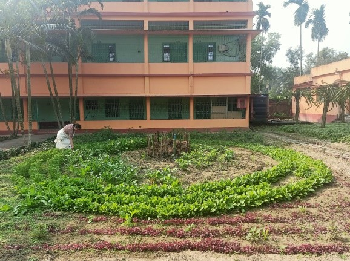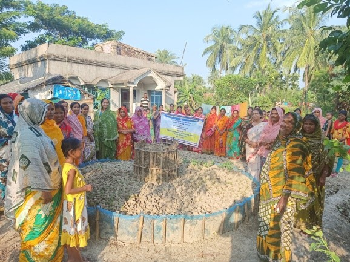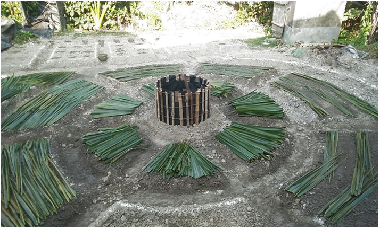The Sundarbans, India’s fragile coastal ecosystem, has long lived under the shadow of cyclones. Each storm leaves behind a trail of devastation, but Cyclone Amphan in particular was catastrophic submerging vast homestead lands in saline water and wiping out standing crops. In Patibunia village of Namkhana block, South 24 Parganas, vegetable and fruit fields remained waterlogged for days, devastating local food systems. For women-headed households already grappling with limited resources, the loss of homegrown produce meant both food and nutritional security were under dire threat.

Amidst this crisis, an innovative, women-friendly solution took root the Keyhole Nutrition Garden.
The Technology: Simple, Sustainable, and Smart
Originally designed in Lesotho, the model was reimagined by KVK, Nimpith, to suit the saline soils of the Sundarbans. The garden is circular with a raised bed and a central compost basket, resembling a keyhole from above. This design ensures continuous composting, nutrient recycling, and efficient water use without relying on chemical fertilizers.
At its heart is a 2-ft compost basket, made with bamboo and filled with kitchen scraps, farm residues, and cow dung. As the waste decomposes, daily watering leaches nutrients directly into the surrounding soil. The raised bed, bordered by bricks and sloping outward, allows excess rainwater to drain while conserving enough moisture to sustain crops even during unpredictable weather.

The uniqueness of this system lies not only in its ecological adaptability but also in its accessibility: it is a low-cost, labour-saving technology, particularly suited for women farmers reclaiming saline homestead land for productive use.
From Trial to Transformation
The journey began with on-farm trials of saline-tolerant, nutrient-rich vegetables such as red basella, cowpea, beetroot, cherry tomato, cauliflower, and cabbage. Encouraged by the results, KVK introduced the model to 50 women farmers through frontline demonstrations. With further refinement, the idea spread quickly. By 2025, over 250 women farmers across South 24 Parganas had adopted Keyhole Nutrition Gardens.
The horizontal scaling was made possible through collaborations with NGOs like Reliance Foundation, NEWS, and local farmer producer organizations (FPOs). Together, they helped expand the model’s reach, turning it into a replicable solution for coastal and saline-prone regions beyond the Sundarbans.
Impact: Nutrition, Empowerment, and Climate Resilience
The transformation has been profound:
•Revival of saline lands: Once barren plots are now thriving with vegetables year-round.
•Household nutrition security: Families access a steady supply of fresh, chemical-free produce.
•Women’s empowerment: Women farmers, equipped with an easy-to-manage technology, are leading the change in their communities.
•Climate resilience: The gardens offer a buffer against extreme weather, making food systems more secure in one of India’s most vulnerable ecosystems.

A Model of Hope
What began as a response to disaster has evolved into a beacon of resilience. The Keyhole Nutrition Garden demonstrates how science, local adaptation, and women’s leadership can turn adversity into opportunity. By reclaiming saline-affected homesteads, it is not only ensuring food and nutrition security but also restoring dignity and self-reliance among rural women.
Today, in the cyclone-scarred landscapes of the Sundarbans, these small circular gardens stand tall as symbols of sustainability and empowerment proof that even the saltiest soils can nurture life and hope.
(Source: ICAR-Krishi Vigyan Kendra, Nimpith and ICAR-Agricultural Technology Application Research Institute, Kolkata)







फेसबुक पर लाइक करें
यूट्यूब पर सदस्यता लें
X पर फॉलो करना X
इंस्टाग्राम पर लाइक करें